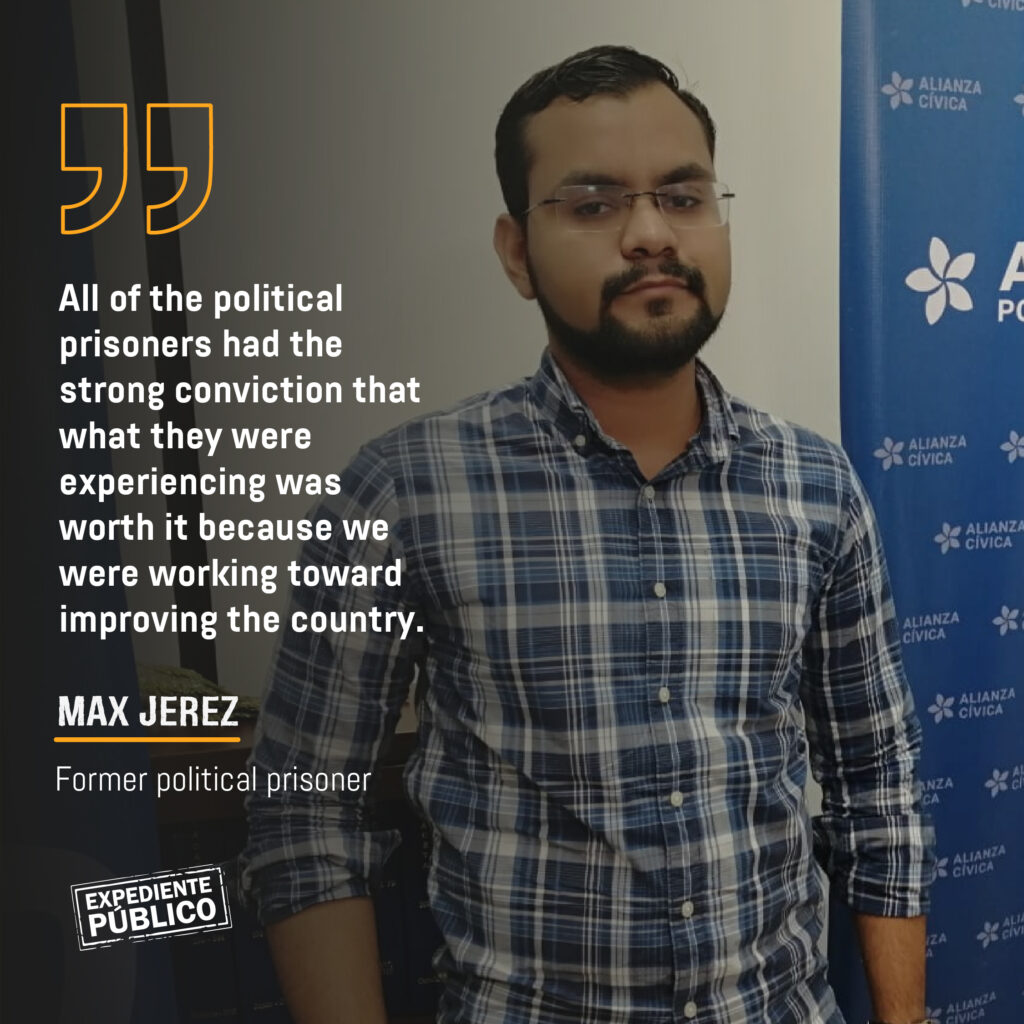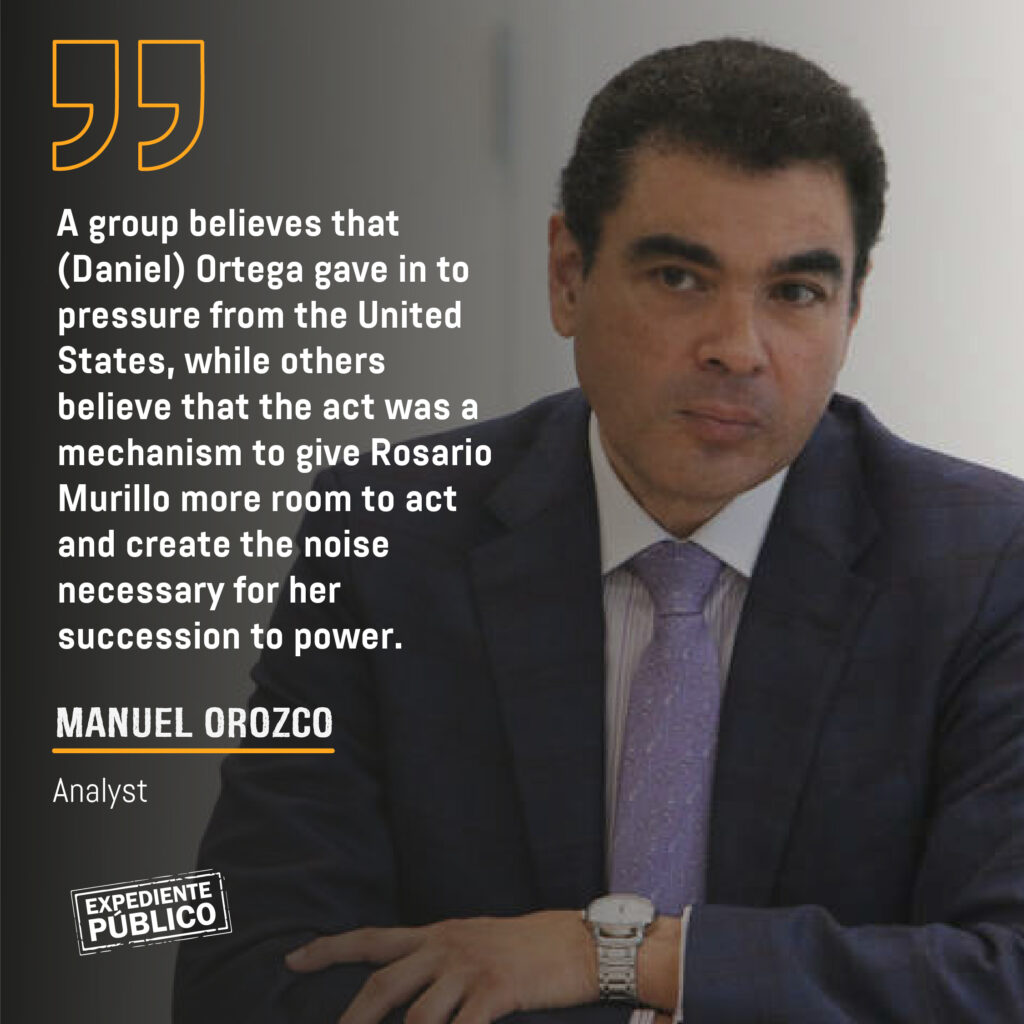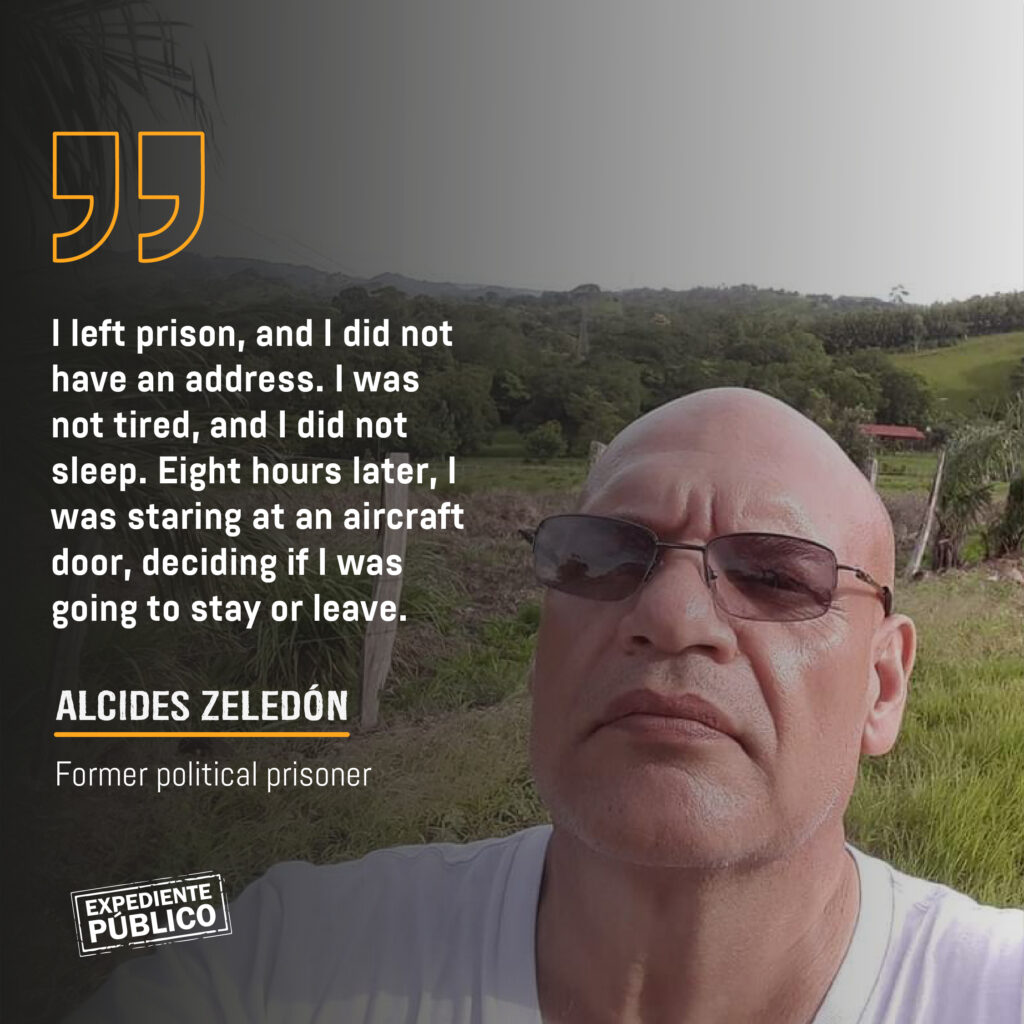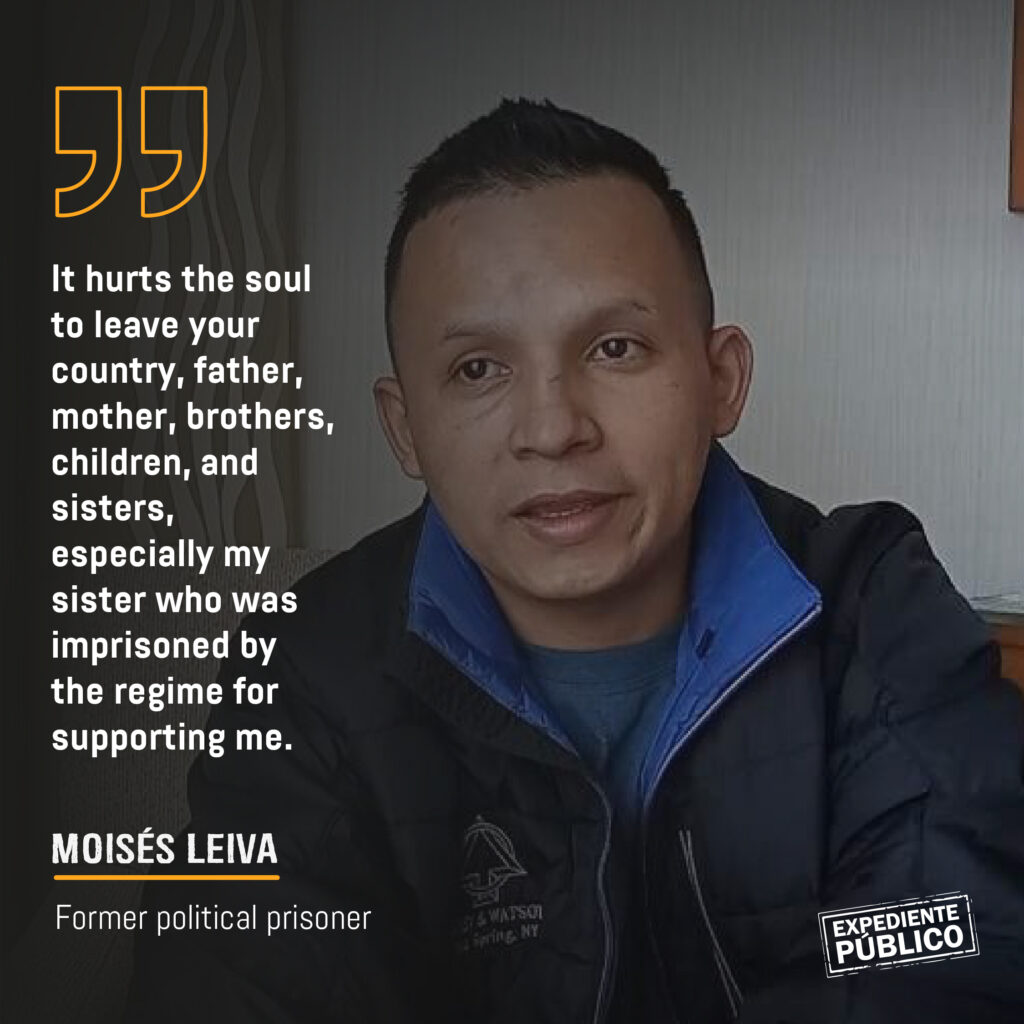*Manuel Orozco, director of the Migration, Remittances, and Development Program of the Interamerican Dialogue analyzed the liberation of political prisoners in Nicaragua, which was possibly one of Daniel Ortega’s parting acts as he readies for the succession of power to Rosario Murillo.
**The specialist affirmed to Expediente Público that the exiling of 222 former political prisoners to the United States was striking for the international community and could tighten its posture toward Ortega and his regime.
Expediente Público
Following the liberation of 222 Nicaraguan political prisoners on February 9, 2020, it is unlikely that an opening and negotiations by the regime or changes in US policy toward Daniel Ortega and his wife, Rosario Murillo, particularly in terms of sanctions, will occur, according to political scientist Manuel Orozco, director of the Migration, Remittances, and Development Program of the Interamerican Dialogue.
The expert considers the move to liberate prisoners as an effort to generate hope within Nicaraguan society.
Moreover, the liberation of prisoners has provoked discontent at the core of the Ortega-Murillo regime’s power apparatus.
The expert pointed out that at the internal level, “one group believes that Ortega ceded to US pressures, while others believe that the act was a mechanism to give Rosario Murillo more room to act and create the noise necessary for her succession to power.”
“Others maintain that there is a political clientelism tied to Ortega in which his loyal followers support the dictator and say that he is doing what is right. But at the end of the day, these three dynamics create tension and more confrontation, which the purges that have been increasing over the last three months will continue to fuel,” he added.
For the international community, the way in which this liberation of prisoners occurred is a sign of the invariability of the regime’s repressive model. Orozco foresees a tightening of policy on Nicaragua because there was “no act of liberation but rather, a continuity in the mistreating of prisoners in banishing them from the country in a humiliating way that implied the stripping of their nationality.”
Moreover, the 26-year-long sentence that Rolando Álvarez received “has had an alienating effect on the regime. The world has become aggravated with Ortega’s actions, which, in some way, has added to the rage and need to increase external pressure, even though international actors know that if they do increase pressure, the regime will threaten political opponents with more repression.”
The dynamics of exile will change
The specialist explained to Expediente Público that until recently, a democratic civil movement organized from different fronts had been taking shape, but given the recent events, the political movement will reemerge, now with those released from prison.
The analyst estimated that a new space has been created for leaders who have been released from prison and want to resume their political careers, which could strengthen or hinder the movement. In any case, the liberation of prisoners will cause a disruption or change in the way civil resistance has been carried out in the last two years.
Orozco also pointed out to Expediente Público that there is a human aspect to reintegration, which has to do with the trauma that the former prisoners now carry, one that is related to the two years spent under difficult conditions of confinement, without access to light, communication with family members, or deficient nutrition.
Moreover, many of these people had never traveled outside of the country when they were suddenly put on a plane and sent to another country and therefore, have few possibilities to reintegrate themselves into their new social and personal realities, independent of their economic class and professional skills, sustained Orozco.
Read: Los cinco fieles a Daniel Ortega y ahora desterrados

According to diaspora organizations, of the 222 former political prisoners, 109 do not have family members or a place to stay in the US, which is why many were supported by outside families and organizations in the US.
A weak Ortega clings on to power
The regime in Nicaragua has been seen as weak since the national elections in 2021 and even the municipal elections in 2022 because of the low voter turnout, considered Orozco. “Internal discontent is growing, and there are factions at the core of the power structure, one that is loyal to the system and in return, receives discretion to act on its own. Many of the purges that can be seen today have to do with those who abused financial favors,” he said.
He evaluated that there is another group of people within the power structure who feel the wear and tear of participating in a closed system, both in terms of living costs and reputation. Their perspective, according to the expert, on maintaining political prisoners was negative as they believe that it is no longer important to the system itself.
“That loss of value is what Ortega interprets as not being worth keeping, especially if he is preparing for Murillo’s succession to power,” he said.
Read: Edward Lacayo, “La loba feroz”: “Nicaragua es una gran prisión”
On the other hand, the Nicaraguan population has lost all interest in Ortega. A survey from the Interamerican Dialogue carried out in January shows that more than 75% of the population does not feel confident or doubts those that surround them. There is also still a high tendency to migrate, and 90% of the population gives Ortega a grade lower than five on a scale of one to ten, he summarized.
For Orozco, Ortega looks to stay in power as long as he can, taking note of the togetherness (or lack thereof) of his internal circle, economic stability at the macro level, and social control, all reasons why he has criminalized democracy in Nicaragua.

The only way in which Ortega would be open to change, according to the analyst, is if he receives favorable conditions to leave office, “but no one wants to offer something beneficial to a person who has been marked as having committed crimes against humanity.”
The bishop’s decision: jail instead of exile
“The Catholic Church is going to have to show a more critical posture before the regime. The Vatican will continue promoting, in a more visual way, that Nicaragua should resolve the situation of Bishop Álvarez.”
The bishop of Matagalpa decided to remain in jail instead of accepting exile, a decision for which the regime sent him to trial, where he was sentenced to 26 years in prison for treason and fake news. He was sent to prison after serving house arrest.
Read: Expresos políticos desterrados de Nicaragua celebran la libertad
The analyst sustained that Ortega does not dialogue but rather is transactional and will wait before considering the benefits of releasing the bishop from prison.
“The imprisonment of Álvarez was an error that will have negative consequences for the regime,” he said. The Vatican will continue to insist on his release, but what remains to be seen is how the Nicaraguan clergy, which has thus far remained silent, reacts, according to Orozco.
“The possibility that they will have to protest is high. They will surely try to ask, publicly, for the freedom of the bishop and for better treatment in terms of religious language. Their narrative will not change; they are not going to turn into politicians. Cardinal Leopoldo Brenes recognizes the mistake of reading a list of demands to Ortega in 2018, which even he did not believe. That said, they will work within their religious language for the liberation of the bishop and his freedoms, which is the core issue affecting Nicaragua.”

He categorized Nicaragua as practically a totalitarian state similar to that of the Taliban, where freedoms do not exist, particularly religious ones. “It is a state that only asks the supreme leader for loyalty,” he added.
Read: Expresos políticos: “operación azul y blanco”
Closed spaces for communication
Orozco dismissed that Ortega would liberate political prisoners to create dialogue because, currently, there are no canals of communication with the international community or with society in general. “The regime communicates in a unilateral way as its perspective is that there is nothing to negotiate and its legitimacy as a dictatorship should be recognized,” he affirmed.
In terms of the opposition, Orozco determined it to be disjointed. “No political movement with the capacity to organize, mobilize, and communicate or mandate from a Nicaraguan sector exists. There are civic groups that try to organize a critical base of supporters. But the civic base is very fragmented due to the repression, independently of whether the former political prisoners try to return to the political base, as there is no base in Nicaragua with which to work.”
Another aspect of the fragmentation is that in the last two years, a new civic group formed that assumed leadership. The former prisoners who want to reintegrate themselves back into society will have to decide if they will work with the other civic groups or work in a parallel manner.

“The most important objective is to return a sense of self-esteem to Nicaraguans within the country. The way to begin to do this is to improve communication between groups regarding occurrences and that the international community says that they are not alone. The level of disinformation and censorship does not allow the international community to know what goes on in Nicaragua. Therefore, the role of Nicaraguans outside of the country is to inform and generate public opinion with family members, as now more than 60% of the population in Nicaragua has a parent living outside of the country,” he concluded.





